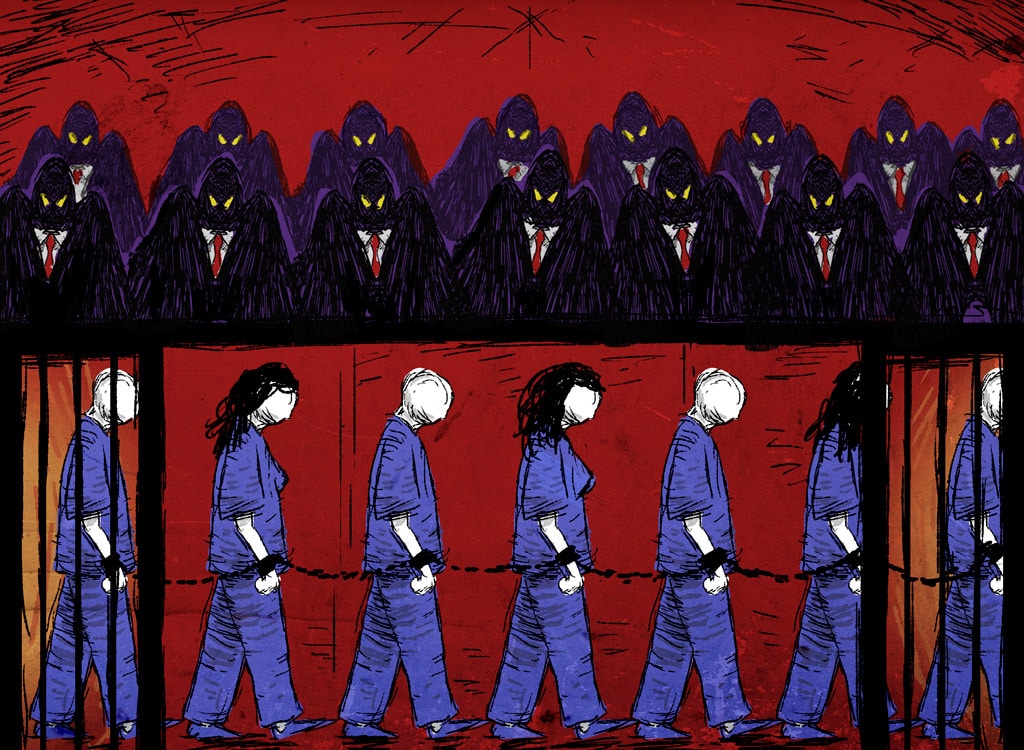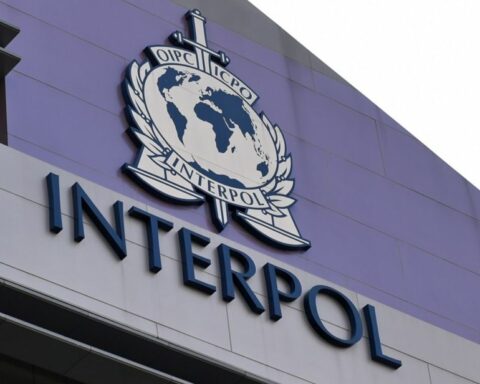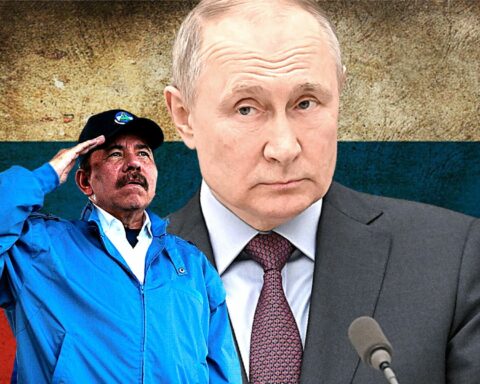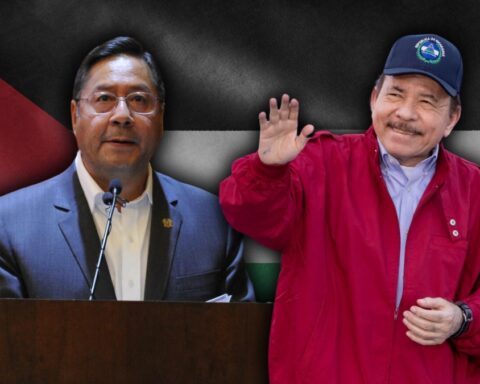Yader Parajón and Yaser Vado were the first convicted by the Ortega justice, on February 1, during the start of the political trials in the El Chipote prison facilities, considered by lawyers and specialists in Criminal Law as a “mockery” for the multiple violations of the guarantees and rights of the accused. But also because of the “quality” of the tests “that border on parody”.
“The political prisoners have been sentenced with ridiculous evidence that proves nothing, other than the thirst for revenge of the regime towards them. They are evidence that in any real trial would fall in two seconds, what they are doing borders on parody, ”says a defender, who for security requests to make this analysis anonymous.
Twitter posts, retweets of messages from other people or international organizations, interviews with the media in which they ask for individual sanctions, interviews with police officers who contradict each other, messages on their cell phones, are some of the spurious evidence presented by the Ortega Prosecutor’s Office in trials against political prisoners.
“None of the evidence confirms the allegations. It’s that easy. That is why we affirm that this is a political trial that is intended to silence critical voices,” adds the defender.
In the case of Parajón and Vado, who were found guilty for the alleged crimes of “conspiracy to undermine national integrity” and for “propagation of false news”, some evidence and stories were presented, says the lawyer, “that They are a mockery of justice.”
Boanerges Fornos, former departmental prosecutor of the Public Ministry and director of the Criminal Action agency, indicates that “the Prosecutor’s Office uses police officers who say what the regime wants them to say” that is why no civilian is seen in political trials.
“On the other hand, (they present as evidence) posts from their Twitter accounts, from their Facebook, the interviews they have given, that is the evidence. If I were there, my proof against me would be this interview with CONFIDENTIAL and that this incites hatred… that type of evidence is what they are using,” argues the lawyer who is outside of Nicaragua.
For Fornos, what they are presenting in the trials “cannot even be called evidence” because “it does not fall into that category.” For this reason, he refuses to call them processes because “they are montages, they are infamies”.
A State Department spokesman accused President Daniel Ortega of running trials riddled with irregularities. “Behind closed doors and with countless procedural irregularities, these trials are a mockery of justice and due process,” he said in an interview with the Voice of America (VOA).
“These trials appear to be intended to terrorize and discourage other Nicaraguans from exercising their rights,” he added.
CONFIDENTIAL He recounted the main “evidence” presented by Ortega in the trials against political prisoners:
Police, as witnesses who contradict each other
In the marathon trial against the youths Yader Parajón and Yaser Vado, the prosecution witnesses were seven agents from Police Station One, who were in charge of the investigative acts. Of these, three gave conflicting accounts and one was reluctant to respond.
A police officer, who was asked how the publications made by Vado, accused of “propagation of false news,” were damaging, replied that “they affect the party,” without specifying which organization she was referring to, although she would allude to the governing Sandinista Front.
Among the evidence that the Prosecutor’s Office showed against the president of the Democratic Renovating Union (Unimos, formerly the Sandinista Renovating Movement), Suyen Barahona, is the testimony of three policemen. One of them, she participated in the search of the Barahona house, on June 13, 2021, when she was arrested without presenting a warrant. Among the alleged evidence provided by them, were included books from the Directorate for Alternative Conflict Resolution (DIRAC, related to mediation processes), which are not their property, but which were seized during the illegal search of their home.
Although the defense questioned the disassociation of the books from the case, the allegations were pointed out as “irrelevant” by the judicial Ulisa Yahoska Tapia Silva; which, in the opinion of Barahona’s husband, Cesar Dubois, demonstrates part of the “farce” of the judicial process.
The Prosecutor’s Office resorted to police officers who served as witnesses in the trial against the sports writer and blogger, Miguel Mendoza. One of the seven officers said that he had participated in the arrest, another assured that he had made an arrest report, a third mentioned that he raided the journalist’s house and found some electronic devices. “Works that do not demonstrate the commission of the crime of conspiracy to undermine national integrity,” said defense attorney Mynor Curtis.
In the trial against the political scientist, José Antonio Peraza, the testimony of four police officers was also used, who could not answer what the evidence presented contained: a cell phone, a computer, memories, hard drives and a series of documents.
The Prosecutor’s Office also called as a witness in the case against peasant leaders Medardo Mairena and Pedro Mena an officer who allegedly conducted undercover investigations and attended the hearing hooded, which in police jargon is known as “code one.”
This person assured that Pedro Mena received financing from abroad for the Peasant Movement, but could not establish the amount of money, the date on which it was obtained, or the exact source of financing. The undercover officer stated that the money came from an NGO, but he did not know which one. In addition, he said that since 2019 they have been monitoring the Peasant Movement. But he did not provide further details.
Tweets and retweets as “proof” of fabricated crimes
In the trial against Dora María Téllez, former guerrilla and founder of the Sandinista Renewal Movement, now the Democratic Renewal Union (Unamos), the Public Ministry resorted to the testimony of four policemen, one of them identified as a computer technician, who revealed that they use network monitoring, through which they identify the interactions of people on Facebook, Twitter, Instagram and YouTube.
Among the evidence that the Prosecutor’s Office cited against the former guerrilla, there are retweets that Téllez made to publications by José Miguel Vivanco, former director of Human Rights Watch; a retweet from a private person who had shared the letter that U.S. senators they sent, in June 2021, to President Joe Biden, urging him to take additional measures, in response to the intensification of the repression that Nicaragua is experiencing.
They also cited an alleged letter from the MRS, where Téllez’s name appeared, but not his signature, and which they claim circulated on Twitter.
Four Twitter posts were also used in the trial against the journalist and presidential candidate of the Democratic Restoration Party (PRD), Miguel Mora. In three of them he shared journalistic notes from 100% Noticias, a media outlet he owns, referring to sanctions from the United States and the United Kingdom.
While in the other tweet he thanked the Secretary General of the Organization of American States (OAS), Luis Almagro, for speaking out in the face of the attack suffered – in October 2020 – against his wife Verónica Chávez.
“On behalf of my wife, Mr. Almagro, I thank you for your words. Nicaragua awaits the declaration of illegitimacy of this criminal Sandinista dictatorship, do not fail us”, indicates the tweet presented as evidence by the Prosecutor’s Office.
For the Brazilian jurist Paulo Abrão, former executive secretary of the Inter-American Commission on Human Rights (IACHR), the fact of establishing as valid evidence expressions that are part of the free thought that each citizen has the right to have, is clear proof of the lack of legitimacy of origin of the alleged evidence with which prisoners of conscience are being sentenced.
“That is an example of the great fragility of these trials, which have no concrete materiality, no evidentiary substance. They have to seek in attitudes of expression of freedom of thought, the foundations to be able to frame them in situations of attack on the nation, the State or national security”, he pointed out.
They also included as part of the evidence against sportswriter Miguel Mendoza, some thirty Twitter posts and a couple of Facebook posts, in which he exercised his right to freedom of expression. During the trial, an officer identified as a computer expert claimed without evidence that the journalist’s publications “caused anxiety.”
Interviews taken out of context
In the trial against Téllez, the Prosecutor’s Office also mentioned two interviews he gave to independent media and two participations at different times with members of the European Parliament.
According to the Prosecutor’s Office, the former guerrilla “called for a boycott against Nicaragua and for sanctions” during the aforementioned interventions. However, in these interviews, according to her she knew CONFIDENTIALTéllez refers to individual sanctions, which do not affect the integrity of the territory.
In the case of Suyen Barahona, statements that he gave to different media outlets were presented as evidence, expressing his assessment of sanctions at the individual level, and not by the State. As well as publications on social networks and chats in which the opponent pointed out her convictions in her struggle.
Something similar happened in the trial against the political scientist, José Antonio Peraza, who was charged with three videos of interviews given; two to the media Mesa Redonda and the third to CONFIDENTIAL.
The first interviews were held in November 2020, before the National Assembly approved Law 1055 or “Sovereignty Law” -of the end of December 2020-, the same with which they justified the arrest and investigation against the political scientist. That means, argue lawyers, that the Prosecutor’s Office uses the law retroactively, including alleged evidence, which at the time did not constitute crimes, because there was not yet a law that stated so.
In addition, in the interview that the political scientist gave to CONFIDENTIALaddressed the electoral issue, the arrest of seven presidential candidates and the lack of conditions for a free, transparent and guaranteed process, but at no time did he exalt or request sanctions or foreign intervention, as indicated by the Public Ministry.
They show fake profiles on social networks
The Nicaraguan University Alliance (AUN) stated, in a statement, that the evidence in the trial against the student leader Lesther Alemán is “fabricated” because the Prosecutor’s Office presented as evidence “a false Facebook profile, two videos of interviews and photographs that In no way can they be evidence of crimes.”








